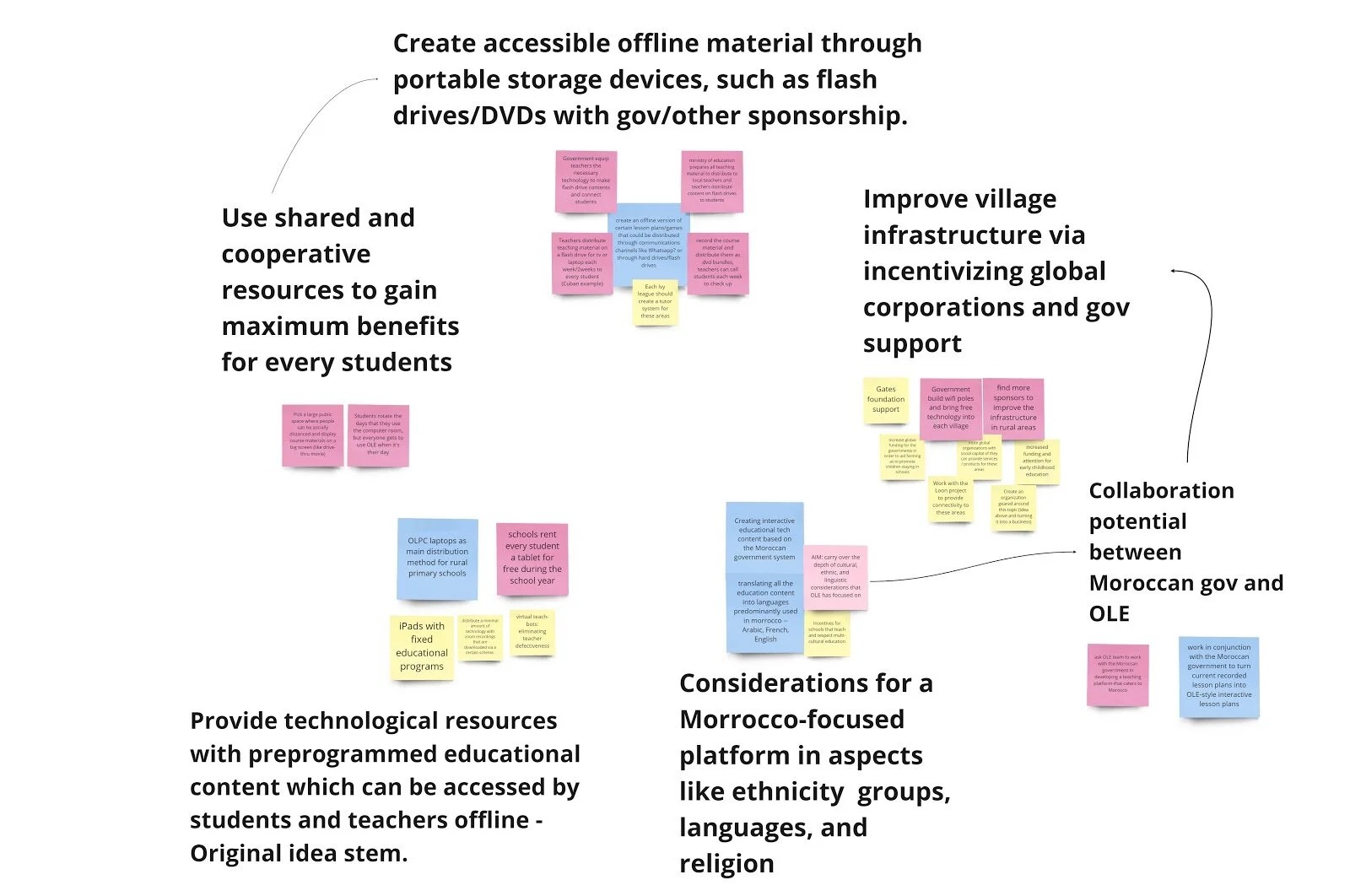
This project focuses on computing and global development. It examines the adoption of Information and Communication Technology (ICT) in education practices and its increasing importance especially during the pandemic. One educational platform we studied was Opening Learning Exchange (OLE) Nepal, an organization dedicated in integrating technology in classrooms to improve social equality and designed an online interactive learning platform. My team and I are exploring ways to apply this approach and the platform in Morocco, where the educational environment is very similar to Nepal’s. Each team member was involved in literature review, user research, data analysis, ideation, and presentation.
OLE Nepal in Morocco
Nepali Educational ICT Intervention & Applicability for Morocco
The Problem
In the context of Nepal’s rural districts, schools are few and far between. A combination of factors like geographical inaccessibility, poverty, and lack of motivation results in significantly lower grade averages, high repetition rates, and the discontinuation of education after primary school. Similarly, in Morocco, USAID reported that less than 15% of students who started first grade complete high school as of 2020.
Research Question
There have been attempts to rectify this broken framework through the use of ICT interventions. One such intervention is Open Learning Exchange (OLE) Nepal. Can an ICT intervention akin to OLE Nepal be appropriately modified and implemented in Morocco? If so, what recommendations can we offer for the adaptation to a Moroccan context?
Literature Review
OLE Nepal:
OLE Nepal is an organization working to increase access to education through the creation of open-source digital education material (like their online library and learning platform E-paath), infrastructure distribution, and teacher training.
Moroccan Education System
Research Areas:
Current state of education
Rural region difficulties
Attempted ICT interventions
Review Findings:
Ethnic and linguistic diversity is not well-represented
Multicultural education is overlooked
Lack of ECE results in dropout or grade repetition
Socioeconomic status impacts success
Lack of access to technology & low motivation
GENIE Program (Generalization of Information and Communication Technologies in Education):
Moroccan effort to generalize ICTE based on infrastructure, teacher training, digital resources, and development of uses.
Student familiarity with their digital environment represents a basic condition for a successful integration of ICT. ——Benfares et al. (2016)
Teachers have weak understanding of the workshops & Moroccan government did not implement enough strategic planning for GENIE. ——-Ismaili (2020)
User Research
For the Nepali online platform, we interviewed members on the OLE development team including game development head, content creator, and community outreach coordinator. In order to gather more comprehensive insights on the education system in Morocco, we interviewed contacts from a rural village, university students, chief in the Ministry of Education, and a journalist focused on higher education in Morocco. During the process, we had to examine multiple official reports and conduct some interviews in french, and later translated them into English.
Contacts from Morocco:
Asmae Fahmi, Beni Koulla contact
Amal Chaibi, sophomore university student
Anouar Boukili, Chief of Service of Education for Handicap Children
Samira Essadik, university student
Daniel Barnard, USAID technical writer on higher education in Morocco
Contacts from OLE Nepal:
Regan Maharjan, game development team
Pawan Dhakal, content creator
Shishir Pandey, community outreach coordinator
Nepal
Morocco
So, can we apply OLE’s framework to Morocco?
YES!
Ideation
Affinity Diagram
Feasibility Matrix
Recommendations
Final Focus Area
Connectivity
From our interviews, the biggest challenge we saw in Morocco was that of the dire lack of technology penetration in rural villages. This was a pattern seen in Nepal too, but OLE’s method of low-cost devices which link to an offline digital library housed on a Raspberry Pi or digital library server was effective in introducing tech to such under-connected regions. We believe that a very similar system of expanding connectivity needs to be addressed. Additionally to deal with the regions frequent power cuts and outages solar panels (obtained through partnerships with local solar companies and donations) could also installed.
Capacity
With everything we’ve learned in this class we know that simply handing over technology does not assure improvement or usage. That’s why we plan on a push for capacity building, primarily amongst teachers. This solution encompasses adapting Morocco’s GENIE program and adding in the robust framework on teacher technology training that OLE routinely does in order to ensure that rolling out the tech does more than just provide laptops That the tech can be meaningfully translated into everyday learning.
Content
All of this would be moot if we don’t have learning materials and content that is contextualized to the Moroccan environment. Some considerations include:
Language accessibility: Arabic, French and English
Early grade reading content in the three languages so students can learn them at an early age
Ethnic diversity in characters and representation of regional cultures represented
Point or leaderboard system within schools to motivate students
Future Work
Implement the connectivity aspect of our focus area
Educate and train teachers with secure connection
Collaborate and create appropriate content
Evaluate the effectiveness of the triple C framework
Improve areas that are lacking within the system
Suggest long-term policies to the Moroccan government
Be a sustainable self-sufficient program









